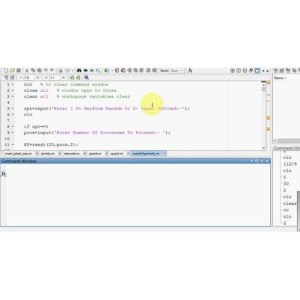Comparative Analysis of FCFS and Priority Scheduling Algorithms in Wireless Communication Systems
Problem Definition
Problem Description:
The problem that this project aims to address is the optimization of scheduling processes in wireless systems. With the increasing number of tasks that need to be completed simultaneously, it is essential to efficiently schedule these tasks to maximize throughput, minimize latency, and improve response time. However, with a variety of scheduling algorithms available, it can be challenging to determine which algorithm is the most effective for a specific wireless system.
This project seeks to compare the First Come First Serve (FCFS) algorithm and the Priority Algorithm in terms of waiting time, burst time, and completion time of processes. By conducting a comparative analysis of these two algorithms, this project aims to identify which algorithm is more efficient and suitable for wireless systems.
Ultimately, the goal is to provide insights into the best scheduling approach for optimizing task completion in wireless systems.
Proposed Work
The project titled "A comparative approach for different Scheduling processes over various parameters" at the M-tech level falls under the wireless category and focuses on scheduling processes. The project explores two scheduling algorithms, namely First Come First Serve (FCFS) and Priority Algorithm, with a comparative analysis conducted afterwards. Scheduling is crucial for managing multiple tasks simultaneously, aiming to maximize throughput while minimizing latency and response time. The FCFS algorithm prioritizes processes based on their arrival time, often leading to longer waiting times for processes with longer execution times. In contrast, the Priority Algorithm assigns priority numbers to processes based on their execution time, reducing waiting times for processes with lower execution times.
The comparison analysis in this project evaluates waiting time, burst time, and completion time of processes under the two algorithms. Implemented using MATLAB software, the project serves to verify and illustrate results to determine the more efficient scheduling algorithm.
Application Area for Industry
This project can be applied across a variety of industrial sectors, especially those that heavily rely on wireless systems for their operations. Industries such as telecommunications, manufacturing, logistics, and healthcare can benefit from the proposed solutions in this project.
For example, in the telecommunications sector, efficient scheduling processes are crucial for managing network traffic and ensuring timely delivery of services to customers. By implementing the findings of this project, telecommunications companies can improve their network throughput, reduce latency, and enhance overall system performance. Similarly, in the manufacturing industry, where automated processes and real-time data transmission are essential, optimized scheduling algorithms can streamline production processes, minimize delays, and increase productivity.
Overall, the proposed solutions in this project can address specific challenges that industries face in managing multiple tasks in wireless systems, such as maximizing throughput, minimizing latency, and improving response time. By determining the most efficient scheduling approach through comparative analysis, industries can optimize task completion, enhance overall system performance, and ultimately improve their competitiveness in the market.
Application Area for Academics
This proposed project can serve as a valuable resource for MTech and PhD students conducting research in the field of wireless systems and scheduling processes. By comparing the FCFS and Priority Algorithm in terms of waiting time, burst time, and completion time of processes, students can gain insights into the effectiveness of different scheduling approaches. This project's relevance lies in its potential to contribute to innovative research methods by exploring the optimization of scheduling processes in wireless systems. Students can use the code and literature from this project to conduct simulations, analyze data, and develop new research methods for their dissertation, thesis, or research papers. This project specifically covers the wireless domain and can be of interest to researchers and students focusing on wireless scheduling and WSN-based projects.
The MATLAB software used in this project provides a practical tool for conducting simulations and analyzing data, making it a valuable resource for students pursuing research in this field. The future scope of this project could include expanding the comparative analysis to include additional scheduling algorithms or exploring the impact of different parameters on scheduling processes in wireless systems. Overall, this project offers a valuable opportunity for MTech students and PhD scholars to engage in innovative research methods and contribute to advancements in the field of wireless systems and scheduling processes.
Keywords
Wireless systems, Scheduling processes, Optimization, Tasks, Throughput, Latency, Response time, Scheduling algorithms, First Come First Serve (FCFS), Priority Algorithm, Waiting time, Burst time, Completion time, Comparative analysis, Efficiency, Wireless networks, MATLAB software, Wireless sensor networks (WSN), Mobile ad hoc networks (Manet), Wimax, Energy efficiency, Networking, Routing, Latest projects, New projects.
| Shipping Cost |
|
No reviews found!



























































No comments found for this product. Be the first to comment!